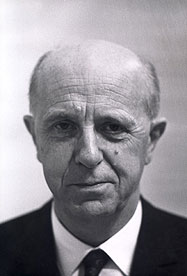Files On-line
Harmel Report
Administrative history:
 In late 1966, the approaching 20th anniversary of NATO and the adjustments made necessary by the French decision of 1966 to withdraw from the military integrated structure prompted the Alliance to re-examine its relevance and adaptation to the existing political context.
In late 1966, the approaching 20th anniversary of NATO and the adjustments made necessary by the French decision of 1966 to withdraw from the military integrated structure prompted the Alliance to re-examine its relevance and adaptation to the existing political context.
At the December 1966 NATO Meeting of Foreign Ministers, Pierre Harmel, Belgium’s Foreign Minister, tabled a proposal calling for a joint analysis of the major events of the past twenty years. He recommended the study be used to determine the effect of events on the objectives and methods of the Alliance and decide whether it was necessary to improve consultation within it. The Foreign Affairs Ministers responded favourably to Harmel’s proposal and empowered Manlio Brosio, NATO Secretary General and the Permanent Representatives to the North Atlantic Council (NAC) with a comprehensive mandate to develop procedures for the study and determine its scope.
In February 1967, the NAC decided to constitute an open-ended Special Group of representatives designated by governments, under the Chairmanship of the Secretary General. The NAC gave the Special Group on the Future Tasks of the Alliance (also known under the reference AC/261) the task of studying “ (a) the development of political events as it affects the purposes of the Alliance; (b) the consequent future tasks of the Alliance”. The Special Group was to establish such special procedures, sub-groups and rapporteurs, and request such staff work from the International Staff as it deemed necessary” [ see reference C-M(67)11].
During the month of March 1967 the Special Group met on five occasions in private session to encourage wide ranging discussions. It was during these meetings that they decided on the framework for the conduct of the study. The Special Group created four sub-groups were created, each working on a broad subject of interest to the Alliance and under the guidance of a rapporteur of repute:
- Sub-Group One, East/West Relations: Mr. K.Schutz, State Secretary, Ministry of Foreign Affairs, Germany and Mr. J.H.A. Watson, Assistant Under Secretary of State. Foreign Affairs, United Kingdom
- Sub-Group Two, Inter-allied Relations: Mr. Paul-Henri Spaak, Minister of State, Belgium
- Sub-Group Three, General Defence Policy : Mr. Foy Kohler, Deputy Under Secretary of State, United States
- Sub-Group Four, Relations with other Countries: Dr. C.L. Patijn, Professor of International Relations, University of Utrecht (Netherlands)
The NATO International Staff provided secretarial support and was tasked with gathering background material for the sub-groups.
The sub-groups met several times from May to June to prepare a draft interim report which was approved by the NAC [se reference C-M(67)33] following some amendments at their Ministerial meeting of 13 - 14 June in Luxembourg.
Following this initial phase, the sub-groups began to address the substantive issues. Although the reports were prepared under the responsibility of each rapporteur, a meeting of all the sub-groups took place in July to harmonise the work and avoid duplication. After having gone through several stages, the reports were reviewed and their findings compared during a last meeting in October at Ditchley Park (UK).
The following month, the Special Group held a high-level meeting over two days during which the substance of the Report was discussed. The Secretary General circulated a draft Report which was discussed and amended by the Special Group on 22 November 1967.
The Report on the Future Tasks of the Alliance was presented at the NATO Ministerial Session and after some last amendments was approved by Foreign Affairs Ministers on 14 December 1967 and subsequently released to the press [See reference C-M(67)74(2nd revised) and M4(67)3, respectively].
This series of files consists of the records created or received by the NATO International Staff and related to the study on the Future Tasks of the Alliance between December 1966 and December 1967. It includes formal and informal documents of the Special Group and of its four Sub-groups as well as documents from the Council, the Secretary General, summary records of private meetings of Permanent Representatives, internal notes and national contributions.
It should be noted that the meetings of the Special Group and of its sub-groups were held in private session. No official minutes of the meetings were issued under reference AC/261.
